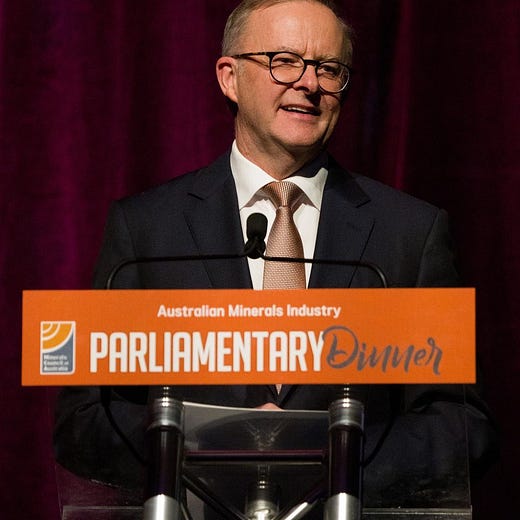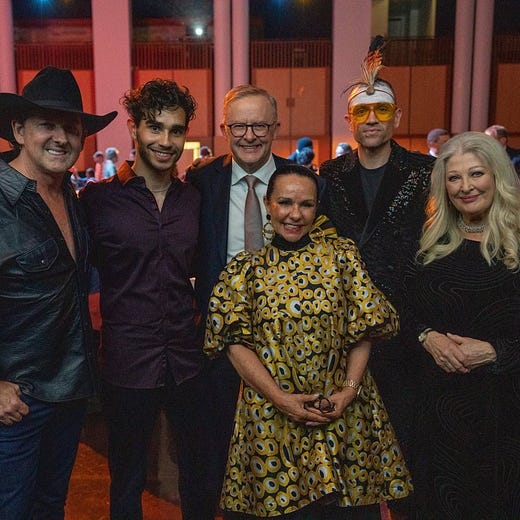The Duopoly
Recent bipartisan consensus on tax cuts for the rich, new goal and gas projects and opposition to a media inquiry highlight major party obstruction to the change that Australians desperately need.
Earlier this week, a division is in progress, Labor sit on one side of the chamber with the Coalition to back their $244 billion stage 3 tax cuts, a sight that became familiar in the spirit of bipartisanship that developed under the previous coalition government. Labor backed dozens of Coalition government bills in its attempt to become a small target, but in the process, fell into the shadow of its predecessor on many issues. Will it look to court the ordinary with its major party colleagues, or govern for the people?
A few days later, at a dinner hosted by the Minerals Council of Australia, the largest and most powerful mining lobby group in the country, Anthony Albanese reassured mining and energy bosses that he wanted to “unlock more value from our minerals”. Then, only a week after the exciting Business Council of Australia dinner, but just the day after the mid-winter ball (sponsored by Woodside), Labor sat alongside the LNP in the major party blob formation. Voting together, perhaps gaggling about the hangover from the night before, they voted together to support further coal and gas projects. Another 114 to be exact!
On one side of the most consequential federal election in recent memory, sit the major parties, pretending its business as usual. But it’s different now. One of them goes off to sulk in a period of aimless opposition after cracking its soul under Morrison, doomed to face a series of identity crises while it painfully sees which conservative mask fits best with the electorate. The other, battlesick after a decade in the political wilderness of long-term opposition, appoints its cabinet, looks around the room and tries to ignore the awkward silences, pretending it holds an absolute mandate. Yet both aspire to preserve their duopolistic control over the avenues of political decision making and seek to protect their interests together against a rising tide of public grievance with major party exclusivity and their rusty resistance to change.
On Twitter, parliamentary “kid wonder”, Senator James Paterson, a self-imposed pseudo tzar of US inspired hard talk and tension related matters (real and perceived) regarding China, congratulates his good friend from the other side of the duopoly, newly appointed chair of the Parliamentary Joint Committee on Intelligence and Security, Labor MP Peter Khalil. Aside from being named in communications released by WikiLeaks as a protected source for the US government linked to releasing information on Labors asylum seeker policy (2007-09), Khalil and Paterson represent the mediocre interchangeable nexus of bipartisan security hawks that covet our strategic decision making processes. Somehow with all the new diversity and fresh perspective, despite the vocal requests to join this committee by the independents and the minor parties, the joint committee on intelligence would remain property of the duopoly.
When newly minted independent Zoe Daniel, a former ABC journalist who won a federal seat running on integrity, tables a motion calling for a judicial inquiry into Media Diversity in Australia, you wouldn’t expect the answer of “not warranted” to come back from new Communications Minister Michelle Rowland, nor the crickets from the Labor members that until only recently railed Ruddite anti-Murdoch doctrine from the backbench, loudly supporting a #murdochroyalcomission.
In the now familiar tango of the major parties, they chose to give the deputy chair role of the Joint Standing Committee on the National Disability Insurance Scheme to Hollie Hughes over an Independent paediatric neurological surgeon or a Greens Senator living with a disability. The ALP/LNP horse trade happens in front of our eyes, the division bell rings the same way every time, and the polity that voted for change collectively scratch their heads, along with some new independent parliamentarians who watch a major party blob move to one side of the room more often than some would like.
In times of uncertain political weather, birds of a feather flock together. After the Mid-Winter Ball, as the ting of the glasses softens during the first course at fancy corporate dinners, and the benches warm at our nations parliament, the major party duopoly looks to block the national interests put forward by the people in order to ensure the material interests of the few corporate titans it has chosen to defend. All the while both of them long for exclusivity over the wheels of power and decision making in this democratic country, and will work together to keep it.
Tony Abbot saw the politics of the carbon tax, ripped it to pieces, recorded it, rewound it, and showed it to everyone again. Chalmers looks us in the eye, tells us nothing is coming to ease the cost of living, and belligerently delivers the most unpopular legislated tax issue of the new millennium. Look like a duopoly to you? You only have to look at the divisions in the senate to start realising that the major parties act as an obstacle to achieving climate action, to taxing the rich, to delivering adequate social safety nets, and acting independently in the national interest when it comes to opening 114 coal and gas projects.
A historic election result communicated an overwhelming desire for change from Australian voters. As the coalition lost seats that it had held since Federation, pushing it into a political wilderness it has not experienced in decades, it did not lose them to the incoming Labor government, who barely limped over the line for the 76 seats required for majority government. It lost them to handpicked grassroots independent candidates and minor parties who have redefined the political landscape of Australia.
Jim Chalmers could have shot the tax cuts out of a cannon on day one. He could have told the captains of industry who pay less tax than the working poor that the goldrush is over, and he would have been applauded. Tanya could have picked up a flaming sword on the big polluters and drew a line in the sand to declare Australia’s world leadership as a nation of climate action and an end to new fossil fuel projects, and millions would have backed her. And Albo could have posted fewer photos on his socials, he could have visited more aged care workers and Unions instead of puppeting to minerals tyrants and titans of industry at exclusive dinners and meeting with heirs to corporate press empires at secret gatherings.
The new government, orbiting barely within the goldilocks zone of its honeymoon period, may look to the polls. But the polls don’t exactly represent praise and adoration to the new major party government, they reflect a repudiation of the major party philosophy of the one that came before it. And maybe a bit of Peter Dutton too. Labor would be foolish to let a favourable Newspoll make it think it has the mandate to be mediocre, or the public blessing to be antithetical to election promises.









I am harsh on them. Its good to be passionately obstreperous when the team thinks its doing better than it is.
That's a little harsh on Labor and the complexities they have to navigate in dealing with these issues. But only a little. Whatever Labor does will be an improvement on the corrupt 3-ring circus that Morrison led. But it shouldn't be too much to hope for major improvements that make a real difference, rather than timid minor improvements than don't make enough difference.